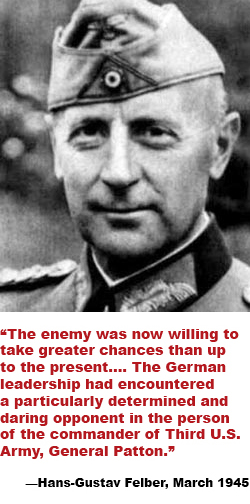 In each of Patton’s operations, the Germans held a high bar for judging success. His 300-mile maneuver from the breakout at Avranches to Verdun in August 1944, was not—as he boasted—the farthest and fastest of any army in history; German panzer groups covered as much as 500 miles in the same amount of time during their invasion of the Soviet Union, without the benefit of passable roads. And his drive to the Moselle with a long, open flank may have been his most daring operation of the war, but such a drive was old hat to the Germans. Panzer Group Kleist and Guderian’s XIX Panzer Corps had done the same along the Somme to the Atlantic in May 1940.
In each of Patton’s operations, the Germans held a high bar for judging success. His 300-mile maneuver from the breakout at Avranches to Verdun in August 1944, was not—as he boasted—the farthest and fastest of any army in history; German panzer groups covered as much as 500 miles in the same amount of time during their invasion of the Soviet Union, without the benefit of passable roads. And his drive to the Moselle with a long, open flank may have been his most daring operation of the war, but such a drive was old hat to the Germans. Panzer Group Kleist and Guderian’s XIX Panzer Corps had done the same along the Somme to the Atlantic in May 1940.
In that context, it’s evident why the Germans offered Patton faint praise during and immediately after the war. But opinions improved over time. Perhaps veteran German commanders, looking back on events with distance and perspective, developed an appreciation for Patton. Hermann Balck, who had expressed thanks for Patton’s mistakes in France, said years later, “Patton was the outstanding tactical genius of World War II. I still consider it a privilege and unforgettable experience to have had the honor of opposing him.” Another likely factor in the reassessment was the growing camaraderie between the United States and Western Germany during the Cold War. Whatever Patton’s enemies thought of him and his battles, in the end he and the other Allied chieftains won and their enemies lost. Field commanders were only one factor in determining that outcome, but they were an important one.
Patton deserves his status as a legendary leader—but posterity deserves fact and not myth. The Germans did not track Patton’s movements as the key to Allied intentions. Hitler does not appear to have thought often of Patton, if at all. The Germans considered Patton a hesitant commanding general in the scrum of position warfare. They never raised his name in the context of worthy strategists. But they respected him in their own demanding terms as a great Panzer General.
It is enough.
Harry Yeide has worked as a foreign affairs analyst with the federal government for nearly 30 years, covering a wide range of issues across the globe. Military history has fascinated him since childhood, an interest he pursues in his writing. His eighth book is the recent Fighting Patton (Zenith Press, 2011). His website is yeide.net.




